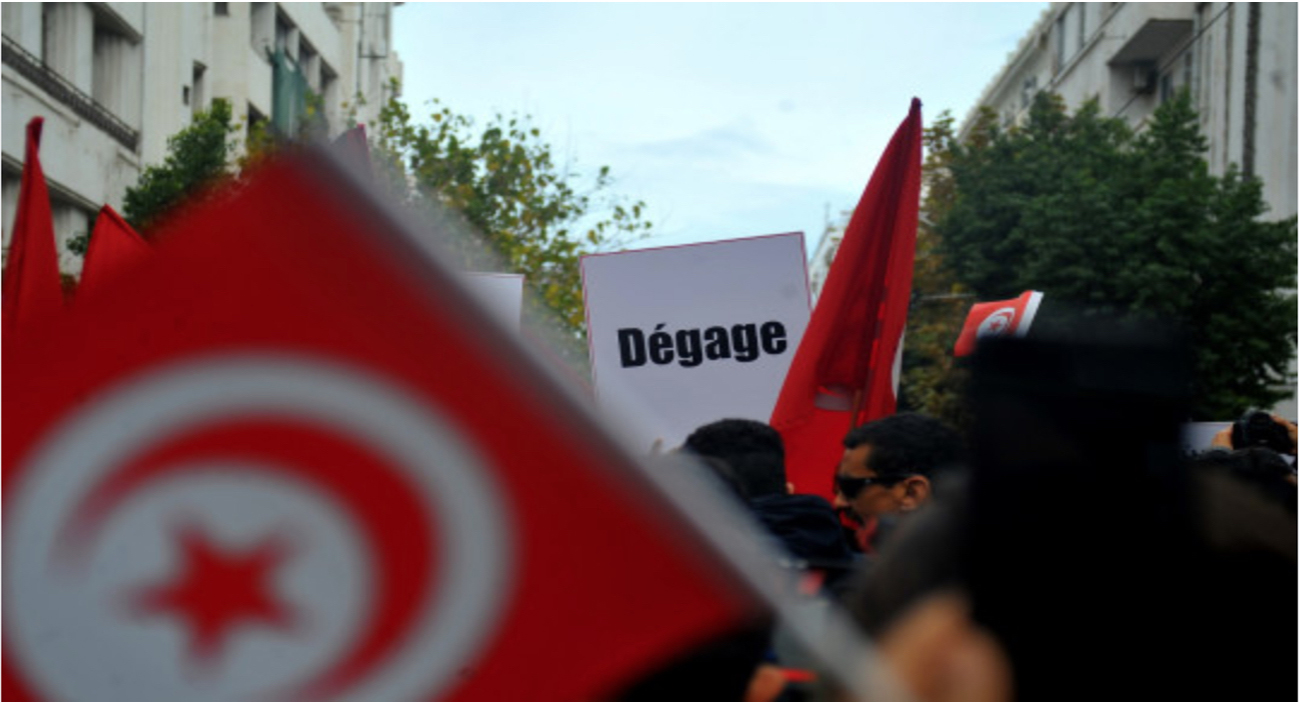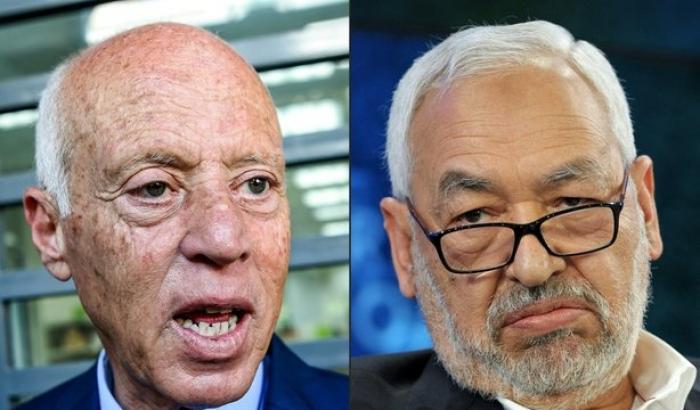The aim of this article is to show through this brief post-14 January 2011 historical survey of the movement of the women of Tunisia for the defense of their acquired rights, and equality and parity the strength of civil society in Tunisia to counter violence and confrontation through dialogue.
However, let’s not forget that the initiative for a dialogue between the various political forces goes back to 2012. Some representatives of women’s organisations participated in this initial attempt to find a solution to the overwhelming issues prevailing in that post-revolution period. Some political parties refused to join. They did, and only reluctantly, in 2013.
It is important to remind that women of/and in Tunisia mobilised for the defense of their acquired rights and the promotion of further rights, and beyond for the model of a modern Tunisia open on the rest of the world from the very first days of the Revolution of 14 January 2011. During their first demonstration in February 2011 they measured the extent of the threat to which they were exposed from all sorts of obscurantists, who encircled the demonstration and eventually pushing women to the pavements of Habib Bourguiba Avenue, and threatening them verbally and physically.
The number of NGO’S having at the crux of their vision and programme the defense of equality of rights, parity, rocketed; women’s increasing participation in civil society is a fact wiedely acknowledged and documented by strong evidence.
The first Tunisian network of a miscellany of NGO’s sharing the common objective of the defense of women’s rights, equality and parity, the ‘Front des Femmes pour l”Egalite’ (Women’s Front for Equality) was set up as early as March 2011. The first commemoration of the promulgation of the Personal Statute Code (1956, before the promulgation of the Constitution of the First Republic in 1958!) on August 13th, 2011 in El Menzah VI Cultural Centre demonstrated the resilience and determination of women of Tunisia to fight for their rights. Further, the important number of participants (men and women) in the difficult conditions at the time brought to light the strong evidence that the defense of women’s rights and equality, the foundations of a democratic society was largely shared.
The inaugural session of ANC (National Assembly), on November 23rd, 2011, took place in Le Bardo in the middle of a demonstration gathering about 3000, with a majority of women calling for the writing, without ambiguity and in golden letters, of women’s fundamental rights and equality in the new constitution.
On International Women’s Day, March 8th, 2012, massive demonstration in le Bardo.
But we shall never remind it enough the Great Demonstration which took place on Independence Day (20 March 2012) was called for by the ‘network Coalition for Women in Tunisia’ (formerly Women’s Front for Equality until the Tunis Palace Congress demonstration, October, 24th, 2011, in the immediate aftermath of the general election which brought the Islamist party Ennahdha to power) in an impressive synchronisation with other initiatives. And here is the opportunity to acknowledge the cogent efficiency of Facebook in networking, synchronising and coordinating such an event; The application for authorisation to demonstrate was submitted to the relevant authority _ the Ministry of Interior_ by the network. The number of participants, according to various sources, reached 50 to 70 000…One day in the future the 20 March 2012 Great Demonstration shall have to be written in the records of history. The huge landslide had only one and a single message addressed to those who ignored that important day, considered as the inception of the new Tunisia after decades of colonisation: hands off independent Tunisia and her founding values!
A couple of weeks or so later, peaceful Tunisian men and women, elderly and young together, came to the streets again to demonstrate on Martyrs’Day, on April 9. The violence of the repression was incommensurate: some of my friends still display the scars in their bodies, and some of us had to fold down their flags so as not to be spotted by the javascript:void(0)police and the militia to run away without being shot by tear gas bombs on their legs and ankles.
A demonstration against violence which was scheduled on June 2nd 2012 was forbidden by the Ministry of Interior. However, the press conference which took place in ‘Cinema Le Mondial’ voiced our demands both at local and international level.
Last but not least, we all still have well rooted in our minds that unprecedented and unique celebration of Women’s Day, on August 13th, 2012. We shall never forget the grandiose demonstration which eventually took momentum to reach circa 20 to 30 000 on Mohamed V Avenue. We shall never forget the exceptional event in the Congress Palace that night.
It is worth emphasising here the conciliation and will for dialogue which prevailed in the preparation of this event. The unravelling of the first preparatory meeting on August 4th, 2012 in the headquarters of the newspaper ‘El Maouqaf’ in Tunis is in itself worth an article!Representatives of a number of NGOs working for the promotion of women’s rights, of a large spectrum of political parties women’s committees, including nascent Nida, and except Ennahdha whose members in ANC defined Tunisian women as men’s ‘complementary’, as well as representatives of UGTT (Tunisian Workers’ General Union). That day represents the gist and the realisation of what dialogue between and amongst otherwise hostile and diverging forces could bring about.
From that day and until August 13th, and most probably for the first time ever in the world history of women’s movements, the contradictions (classes, politics, visions…) dissolved in the determination of all the forces to defend a project for Tunisia that would not stamp on women’s bodies.
sabato 10 ottobre 2015 Donne tunisine e il premio Nobel per la paceObiettivo di questo articolo è di illustrare con una breve rassegna storica del post 14 gennaio 2011 il movimento delle donne tunisine per la difesa dei diritti acquisiti, l’uguaglianza e la parità, la forza della società civile tunisina nel contrastare la violenza e lo scontro attraverso il dialogo. Tuttavia non dobbiamo dimenticare che l’iniziativa per il dialogo tra le varie forze politiche inizia nel 2012. Alcune rappresentanti delle organizzazioni delle donne hanno partecipato a questo primo tentativo per trovare una soluzione agli enormi problemi che si sono presentati dopo la rivoluzione. Alcuni partiti politici si sono rifiutati di partecipare. Si sono convinti a partecipare, con molta riluttanza, nel 2013.
È importante ricordare che le donne in Tunisia hanno mobilitato per la difesa dei loro diritti acquisiti e la promozione di nuovi diritti, per promuovere il modello di una Tunisia moderna aperta al resto del mondo nei primissimi giorni della Rivoluzione del 14 gennaio 2011. Durante la prima manifestazione nel febbraio 2011 hanno verificato l’ampliarsi delle minacce alle quali erano sottoposte da ogni sorta di oscurantismi, che circondavano la manifestazione spingendo le donne sui marciapiedi dell’Avenue Habib Bourguiba, minacciandole verbalmente e fisicamente.
La prima rete tunisina di diverse Ong con il comune obiettivo della difesa dei diritti delle donne, eguaglianza e parità, Il Fronte delle donne per l’uguaglianza (Front des femmes pour l’egalité) è stato creato all’inizio di marzo del 2011. La prima commemorazione della promulgazione del Codice di statuto personale (1956, prima della promulgazione della Costituzione della Prima Repubblica nel 1958) il 13 agosto del 2011 al centro culturale di Menza VI ha dimostrato la capacità e la determinazione delle donne tunisine per lottare per i loro diritti. Inoltre, il numero importante di partecipanti (donne e uomini) in condizioni difficili nello stesso tempo ha messo in grande evidenza che la difesa dei diritti delle donne e dell’uguaglianza, la fondazione di una società democratica era largamente condivisa. La sessione inaugurale dell’Assemblea nazionale costituente il 23 novembre 2011, che ha avuto luogo al Bardo nel mezzo di una manifestazione di circa 3000 persone, con una maggioranza di donne che chiedevano la scrittura, senza ambiguità e in lettere d’oro, dei diritti fondamentali delle donne e l’uguaglianza nella costituzione. L’8 marzo 2012, giornata internazionale della donna, un’altra manifestazione si è tenuta al Bardo.
Il giorno dell’Indipendenza (20 marzo 2012) la Coalizione per le donne della Tunisia (già Fronte delle donne tunisine per l’eguaglianza fino alla manifestazione davanti al palazzo dei Congressi il 24 ottobre 2011, subito dopo le elezioni che avevano portato al potere il partito islamista Ennahdha) con un impressionante sincronismo con altre iniziative. Grazie all’opportunità offerta dall’efficienza di Facebook nel mettere in rete, sincronizzare e coordinare un simile evento. La richiesta di autorizzazione per la manifestazione era stata presentata alle massime autorità – il Ministro dell’Interno – dalla rete. Il numero di partecipanti, secondo le varie fonti, aveva raggiunto da 50 a 70.000… Un giorno, nel futuro, la grande manifestazione del 20 marzo 2012 dovrà passare alla storia. La vittoria schiacciante aveva un solo e singolo messaggio indirizzato a coloro che ignoravano questa data importante, considerata come l’inizio della nuova Tunisia dopo decenni di colonizzazione: piena indipendenza della Tunisia e dei suoi valori fondativi! Circa due settimane dopo, tunisini e tunisine pacifici, giovani e anziani insieme, sono tornati in piazza per manifestare nel giorno dei Martiri, il 9 aprile. La violenza e la repressione sono state inaudite: alcuni dei miei amici portano ancora le cicatrici sui loro corpi, alcuni di noi hanno dovuto nascondere le loro bandiere per non essere rovinate dalla polizia e dalla milizia, abbiamo dovuto scappare per evitare di essere colpiti dai lacrimogeni alle gambe e alle caviglie.
Una manifestazione contro la violenza fissata per il 2 giugno 2012 è stata proibita dal ministro dell’interno. Comunque la conferenza stampa tenuta al Cinema Le Mondial ha fatto sentire la nostra voce a livello nazionale e internazionale.
Ultimo ma non meno importante, abbiamo ben radicato nelle nostre menti la manifestazione unica e senza precedenti della Giornata della donna il 13 agosto 2012. Non dimenticheremo mai la grandiosa manifestazione che in alcuni momenti ha raggiunto 20-30.000 persone sull’Avenue Mohamed. Non dimenticheremo l’eccezionale evento di quella sera al Palazzo dei congressi. Occorre sottolineare la conciliazione e volontà per il dialogo che erano prevalsi nella preparazione di questo evento. La confusione del primo incontro preparatorio del 4 agosto 2012 che si era tenuto nella sede del giornale El Maouqaf che ha anche prodotto un articolo! Rappresentanti di Ong che lavorano per la promozione dei diritti delle donne, un largo spettro di comitati delle donne di vari partiti, inclusa la nascente Nida, con l’eccezione di Ennahdha i cui membri all’interno della Costituente definivano le donne tunisine «complementari» ai maschi, rappresentanti dell’Ugtt (Unione generale dei lavoratori tunisini). Quel giorno rappresenta l’origine e la realizzazione di quello che il dialogo tra, in altri casi, forze ostili o divergenti può portare.
‘




